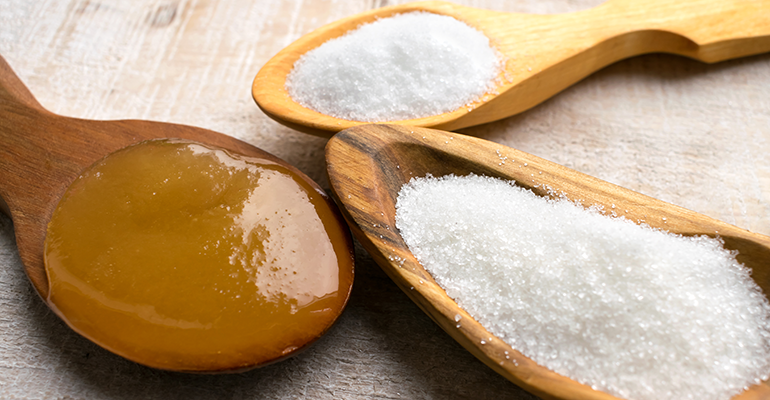News
Are new WHO sweeteners guidelines ‘a disservice’ to public health?
6 Sep 2022
New draft recommendations from the World Health Organization (WHO) warn that zero-calorie sweeteners should not be used to help weight control or reduce the risk of noncommunicable diseases’ (NCDs) – sparking mixed reactions from industry groups.
Non-nutritive sweeteners – such as stevia, aspartame, acesulfame potassium (ace-k), and monk fruit – are regularly used as sugar replacers in food and drink products, where they provide sweetness without calories (or with very low calories). However, new draft guidance from the WHO warns against the use of such sweeteners, arguing that although they may be safe to consume they do not drive significant changes to consumption patterns or encourage healthy eating habits.

Indeed, the guidelines suggest that no- and low-calorie sweeteners are frequently used to make ‘highly processed' low sugar or sugar-free junk foods, and as such do not encourage any fundamental shifts towards a healthy diet rich in whole foods.
“Since the release of the WHO guideline on free sugars intake, interest in the potential utility of non-sugar sweeteners in reducing sugars intake at the population level has increased,” noted the WHO, adding that non-sugar sweeteners are low- or no-calorie alternatives to free sugars that are generally marketed as aiding weight loss or maintenance of healthy weight.
"Because free [ie. added] sugars are often found in highly processed foods and beverages with undesirable nutritional profiles, simply replacing free sugars with non-sugar sweeteners results in a food or beverage in which any other unhealthy elements are mostly retained, and as a result, the overall quality of the diet remains largely unaffected."
Sugar taxes and marketing regulations spark discussion over sweeteners
Speaking at an online event to launch public consultation of the guidance, Dr Chizuru Nishida, unit head for the WHO’s Safe, Healthy and Sustainable Diet Unit said its 2015 Guideline on sugar intake – which recommended reductions to the intake of free sugars and that both adults and children should limit added sugar consumption to less than 10% of energy intakes – led to a number of questions relating to the use of non-sugar sweeteners.
As of the 2015 Guideline, Nishida noted that many countries have set ambitious targets to reduce levels of free sugars in foods and drinks, with regulatory measures such as tax policies on sugar sweetened beverages (SSBs) and limiting marketing of high fat, sugar and salt (HFSS) foods and drinks.
“As of May 2022, we have two countries that are implementing SSB taxations,” she noted. “In implementing SSB taxation, we were asked by various countries if the WHO would also recommend to tax beverages with non-sugar sweeteners.”
Nishida added that in an effort to support countries implementing restrictions to the marketing of HFSS products, all six regional offices of the WHO have developed nutrient profiling models to guide marketing regulations.
“In some of these models, some regions included non-sugar sweeteners as part of general conditions for exclusions, while several included sweeteners as part of the nutrients of concerns,” she said.
However, Nishida noted that the guideline is not a reassessment of the safety on sweeteners, and is not intended to provide updated or alternative guidance on safety or maximal levels – which are set by national or regional safety authorities such as the FDA or EFSA.
What are the WHO guidelines?
Speaking at the same event, Prof. Shiriki Kumanyika, chair of the WHO Nutrition Guidance Expert Advisory Group (NUGAG) Subgroup on Diet and Health, and emeritus professor at the Perelman School of Medicine, University of Pennsylvania, said the recommendation has been made based on a systematic review of the scientific evidence of the health effects non-sugar sweeteners.
This found no evidence of long‐term benefit on measures of body fatness in adults or children but did identify potential ‘undesirable effects’ from long‐term use in the form of increased risk of type 2 diabetes, cardiovascular diseases, and mortality in adults, and from short‐term use during pregnancy.

©AdobeStock/New Africa
WHO: Non-sugar sweeteners not be used for weight control
“WHO suggests that non-sugar sweeteners not be used as a means of achieving weight control or reducing risk of noncommunicable diseases,” confirmed Kumanyika.
She added that the recommendation was made based on evidence which suggests that there are health effects associated with sweetener use irrespective of the type of sweetener used – suggesting that non-sugar sweeteners as a class of compounds, despite having different chemical structures, have a similar impact on health.
“Replacing free sugars in the diet with sources of naturally occurring sweetness, such as fruits, as well as minimally processed unsweetened foods and beverages, will help to improve dietary quality and should be the preferred alternatives to foods and beverages containing free sugars,” added Kumanyika.
Industry reaction: A disservice to public health?
Industry stakeholders and associations have reacted to the new WHO guideline with disappointment, with groups claiming the findings do a “disservice to public health” by failing to recognize the role of sweeteners in sugar and calorie reduction.
“Low/no calorie sweeteners are no magic bullet. However, they mean people can enjoy food and drinks that have less sugar, fewer calories while still meeting their taste preferences,” commented Robert Peterson, Chairman of the International Sweeteners Association (ISA).
“The benefit of replacing added sugars with low/no calorie sweeteners in reducing calorie intake and aiding in weight management is supported by evidence reviewed by WHO, the US Dietary Guideline Advisory Committee of the Dietary Guidelines for Americans, 2020-202512, and numerous published systematic reviews and meta-analyses,” he added.
“Failing to recognise the role of low/no calorie sweeteners in sugar and energy reduction, and ultimately in weight management is a disservice to public health.”
